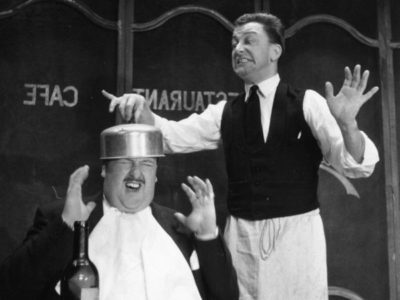There’s an unwritten code among restaurant folk, when someone from another restaurant comes to our house, we do our best to treat them like family. We refill their wine glasses without their asking, spoil them with an extra dessert or send after dinner drinks to show solidarity. Of course, there are occasions when we don’t know we’re serving an industry person, but it’s usually pretty easy to figure out because they’re annoying.
Here are ten easy ways you can spot restaurant people from a mile away:
1. They go out of their way to avoid telling you they work in a restaurant even though it’s totally obvious. – You think we can’t hear you whispering about how you have the same Chateauneuf du Pape on your restaurant’s wine list for $10 cheaper? We knew from the minute you proudly announced, “I’d love to start with an aperitif” that you were undercover. No one uses the word aperitif unless they work in a restaurant.
2. They will eventually end up finally telling you they work in a restaurant, then get upset if you don’t comp anything. – We see you scrutinizing the bill looking for freebies. You’re probably also trying to figure out how generous you should tip, but we also know you’ll spend the next two hours bitching about how you can’t believe we charged you for everything. Then you’ll rant for another two hours about how your restaurant is waaay more generous to industry people.
3. They assume that whatever they do at their restaurant you also do at your restaurant. – “You don’t have tartar sauce for the crab cakes?” they’ll ask. No, we don’t have tartar sauce. It’s really too bad that you work at a shitty pub and they serve their crab cakes with tartar, mate. Have the remoulade we gave you and shut the (bleep) up.
4. They ask too many obnoxiously detailed questions – “Do you know if the kitchen uses Maldon Salt?” You can’t be serious.
5. They pretend to know a lot about food and wine but they really only know about the food and wine where they work. – Will you please stop asking if the wine undergoes malolactic fermentation? You don’t even know what that means. It’s really great that you just learned about this in wine class but this isn’t Kendall-Jackson, just order the damn Chardonnay.
 6. They always pronounce ethnic dishes on the menu with an over-the-top accent. – There’s no need for you to sound like Berlusconi every time you order a pasta dish. Simmer down, Caravaggio.
6. They always pronounce ethnic dishes on the menu with an over-the-top accent. – There’s no need for you to sound like Berlusconi every time you order a pasta dish. Simmer down, Caravaggio.
7. They name drop staff members who haven’t worked at your restaurant in years. – Tim? Who’s Tim? Yeah… sorry… there’s no one named Tim here anymore.
8. They hate people who stay late in restaurants yet when they dine out they’re always the last table. – You must’ve forgotten the tirade you went on last week when some douchebag sat there with empty cocktail glasses an hour after paying the check because that’s exactly what you’re doing right now.
9. They always order Fernet Branca. – Even though we all know it’s disgusting.
10. They pay with a credit card and tip in cash. – Restaurant people know that cash tips don’t always have to be declared which helps avoid taxes. Not to mention that most waiters’ credit cards are probably maxed out anyway.



 Restaurant work often requires a firm hand, but because of these antiquated hospitality credos we struggle to use it authoritatively. When entitled VIPs or diva celebrities come in, kitchen and waitstaff are expected to break whatever rules necessary to make them happy because… well… that’s our job. In fine dining, we use the abbreviation “WTW” (whatever they want) and, in the wrong hands, it’s a blank check to satisfy the most sadistic impulses. When the dust settles, they leave happy but we leave physically and psychologically exhausted.
Restaurant work often requires a firm hand, but because of these antiquated hospitality credos we struggle to use it authoritatively. When entitled VIPs or diva celebrities come in, kitchen and waitstaff are expected to break whatever rules necessary to make them happy because… well… that’s our job. In fine dining, we use the abbreviation “WTW” (whatever they want) and, in the wrong hands, it’s a blank check to satisfy the most sadistic impulses. When the dust settles, they leave happy but we leave physically and psychologically exhausted.